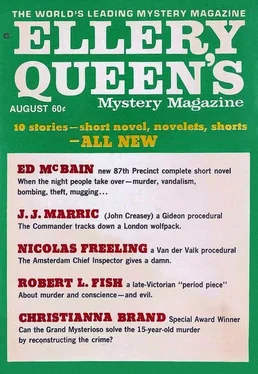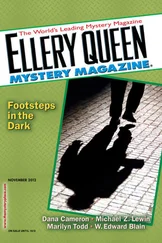Эллери Куин - Ellery Queen’s Mystery Magazine. Vol. 56, No. 2. Whole No. 321, August 1970
Здесь есть возможность читать онлайн «Эллери Куин - Ellery Queen’s Mystery Magazine. Vol. 56, No. 2. Whole No. 321, August 1970» весь текст электронной книги совершенно бесплатно (целиком полную версию без сокращений). В некоторых случаях можно слушать аудио, скачать через торрент в формате fb2 и присутствует краткое содержание. Город: New York, Год выпуска: 1970, Издательство: Davis Publications, Жанр: Детектив, на английском языке. Описание произведения, (предисловие) а так же отзывы посетителей доступны на портале библиотеки ЛибКат.
- Название:Ellery Queen’s Mystery Magazine. Vol. 56, No. 2. Whole No. 321, August 1970
- Автор:
- Издательство:Davis Publications
- Жанр:
- Год:1970
- Город:New York
- ISBN:нет данных
- Рейтинг книги:5 / 5. Голосов: 1
-
Избранное:Добавить в избранное
- Отзывы:
-
Ваша оценка:
- 100
- 1
- 2
- 3
- 4
- 5
Ellery Queen’s Mystery Magazine. Vol. 56, No. 2. Whole No. 321, August 1970: краткое содержание, описание и аннотация
Предлагаем к чтению аннотацию, описание, краткое содержание или предисловие (зависит от того, что написал сам автор книги «Ellery Queen’s Mystery Magazine. Vol. 56, No. 2. Whole No. 321, August 1970»). Если вы не нашли необходимую информацию о книге — напишите в комментариях, мы постараемся отыскать её.
Ellery Queen’s Mystery Magazine. Vol. 56, No. 2. Whole No. 321, August 1970 — читать онлайн бесплатно полную книгу (весь текст) целиком
Ниже представлен текст книги, разбитый по страницам. Система сохранения места последней прочитанной страницы, позволяет с удобством читать онлайн бесплатно книгу «Ellery Queen’s Mystery Magazine. Vol. 56, No. 2. Whole No. 321, August 1970», без необходимости каждый раз заново искать на чём Вы остановились. Поставьте закладку, и сможете в любой момент перейти на страницу, на которой закончили чтение.
Интервал:
Закладка:
“And my husband, in his dark universe, listens to the sounds my father puts on tape and visualizes things he cannot quite believe and so he asks me to notify the police because he needs an impartial observer to contradict the suspicion that someone is stealing pennies from his blind man’s cup. That’s why I came to you, Detective Meyer. So that you would arrive here tonight and perhaps be fooled as I was fooled at first, and perhaps say to my husband, ‘Yes, Mr. Gorman, there are ghosts in your house.’ ”
She suddenly placed her hand on his sleeve. The tears were streaming down her face, she had difficulty catching her breath. “Because you see, Detective Meyer, there are ghosts in this house, there really and truly are. The ghost of a proud man who was once a brilliant judge and who is now a gambler and a thief; and the ghost of a man who once could see, and who now trips and falls in the darkness.”
On the river a tugboat hooted. Adele Gorman fell silent. Meyer opened the door of his car and got in behind the wheel.
“I’ll call your husband tomorrow,” he said abruptly and gruffly. “Tell him I’m convinced something supernatural is happening here.”
“And will you be back, Detective Meyer?”
“No,” he said. “I won’t be back, Mrs. Gorman.”
In the squadroom they were wrapping up the night. Their day had begun at 7:45 P.M. yesterday, and they had been officially relieved at 5:45 A.M.; but they had not left the office yet because there were questions still to be asked, reports to be typed, odds and ends to be put in place before they could go home. And since the relieving detectives were busy getting their approaching workday organized, the squadroom at 6:00 A.M. was busier than it might have been on any given afternoon, with two teams of cops getting in each others’ way.
In the Interrogation Room, Carella and Hawes were questioning young Ronald Sanford in the presence of the Assistant District Attorney who had come over earlier to take Mrs. Martin’s confession, and who now found himself listening to another one when all he wanted to do was go home to sleep. Sanford seemed terribly shocked that they had been able to notice the identical handwriting in The Addison Hotel and The Avenging Angel — he couldn’t get over it. He thought he had been very clever in misspelling the word “clothes,” because then they would think some illiterate had written it, not someone who was studying to be an accountant.
He could not explain why he had killed Mercy Howell. He got all mixed up when he tried to explain that. It had something to do with the moral climate of America, and people exposing themselves in public, people like that shouldn’t be allowed to pollute others, to foist their filth on others, to intrude on the privacy of others who only wanted to make a place for themselves in the world, who were trying so very hard to make something of themselves, studying accounting by day and working in a hotel by night, what right had these other people to ruin it for everybody else?
Frank Pasquale’s tune, sung in the Clerical Office to Kling and O’Brien, was not quite so hysterical, but similar to Sanford’s nonetheless. He had got the idea together with Danny Ryder. They had decided between them that the blacks in America were taking jobs away from decent hardworking people who only wanted to be left alone, what right did they have to force themselves on everybody else? So they had decided to bomb the church, just to show them they couldn’t get away with it, not in America. He didn’t seem terribly concerned over the fact that his partner was lying stone-cold dead on a slab at the morgue, or that their little Culver Avenue expedition had cost three people their lives, and had severely injured a half dozen others. All he wanted to know, repeatedly, was whether his picture would be in the newspaper.
At his desk Meyer Meyer started to type up a report on the Gorman ghosts, then decided the hell with it. If the lieutenant asked him where he’d been half the night, he would say he had been out looking for trouble in the streets. The Lord knew there was enough of that around, any night. He pulled the report forms and their separating sheets of carbon paper from the ancient typewriter, and noticed that Detective Hal Willis was pacing the room anxiously, waiting to get at the desk the moment he vacated it.
“Okay, Hal,” he said, “it’s all yours.”
“Finalmente!” Willis, who was not Italian, said.
The telephone rang.
The sun was up when they came out of the building and walked past the hanging green “87” globes and down the low flat steps to the sidewalk. The park across the street shimmered with early-morning autumn brilliance, the sky above it was clear and blue. It was going to be a beautiful day.
They walked toward the diner on the next block, Meyer and O’Brien ahead of the others, Carella, Hawes, and Kling bringing up the rear. They were tired, and exhaustion showed in their eyes, in the set of their mouths, in the pace they kept. They talked without animation, mostly about their work, their breaths feathery and white on the cold morning air.
When they reached the diner, they took off their overcoats and ordered hot coffee and cheese Danish and toasted English muffins. Meyer said he thought he was coming down with a cold. Carella told him about some cough medicine his wife had given one of the children. O’Brien, munching on a muffin, glanced across the diner and saw a young girl in one of the booths. She was wearing blue jeans and a bright colored Mexican serape, and she was talking to a boy wearing a Navy pea jacket.
“I think I see somebody,” he said, and he moved out of the booth past Kling and Hawes, who were talking about the newest regulation on search and seizure.
The girl looked up when he approached the booth.
“Miss Blair?” he said. “Penelope Blair?”
“Yes,” the girl answered. “Who are you?”
“Detective O’Brien,” he said, “Eighty-seventh Precinct. Your mother was in last night, Penny. She asked me to tell you—”
“Flake off, cop,” Penelope Blair said. “Go stop a riot somewhere.”
O’Brien looked at her silently for a moment. Then he nodded, turned away, and went back to the table.
“Anything?” Kling asked.
“You can’t win ’em all,” O’Brien said.
Notes
1
© 1970 by Nicolas Freeling.
2
© 1970 by J. J. Marric (John Creasey).
3
© 1970 by Richard O. Lewis
4
© 1970 by Robert Edward Eckels.
5
© 1970 by Alan K. Young.
6
© 1970 by Elizabeth Palmer
7
© 1970 by Celia Fremlin.
8
© 1970 by Christianna Brand.
9
© 1970 by Robert L. Fish.
10
© 1970 by Simon Troy.
Интервал:
Закладка:
Похожие книги на «Ellery Queen’s Mystery Magazine. Vol. 56, No. 2. Whole No. 321, August 1970»
Представляем Вашему вниманию похожие книги на «Ellery Queen’s Mystery Magazine. Vol. 56, No. 2. Whole No. 321, August 1970» списком для выбора. Мы отобрали схожую по названию и смыслу литературу в надежде предоставить читателям больше вариантов отыскать новые, интересные, ещё непрочитанные произведения.
Обсуждение, отзывы о книге «Ellery Queen’s Mystery Magazine. Vol. 56, No. 2. Whole No. 321, August 1970» и просто собственные мнения читателей. Оставьте ваши комментарии, напишите, что Вы думаете о произведении, его смысле или главных героях. Укажите что конкретно понравилось, а что нет, и почему Вы так считаете.












